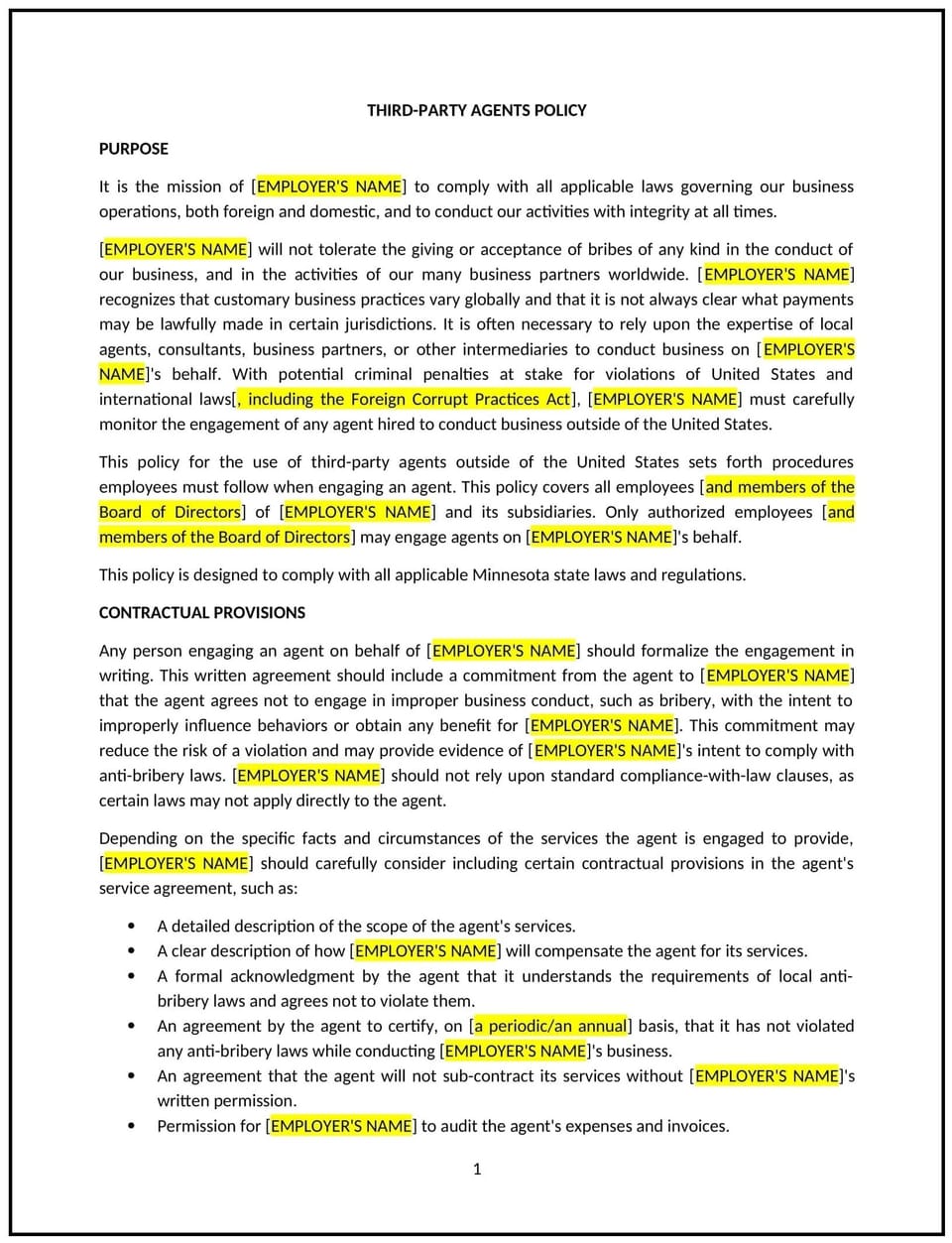Third-party agents policy (Minnesota): Free template

Third-party agents policy (Minnesota)
This third-party agents policy is designed to help Minnesota businesses establish guidelines for engaging and managing third-party agents, contractors, vendors, and other external partners. The policy outlines expectations for conduct, performance, confidentiality, and legal obligations when working with external partners.
By adopting this policy, businesses can minimize risks, protect company interests, and ensure consistency in how third-party relationships are handled.
How to use this third-party agents policy (Minnesota)
- Define third-party agents: Clearly define who qualifies as a third-party agent, including contractors, consultants, vendors, and other external partners.
- Establish engagement procedures: Outline how third-party agents are selected, evaluated, and contracted, ensuring due diligence is applied to prevent conflicts of interest and ensure alignment with the business's values.
- Set performance expectations: Specify the standards of performance expected from third-party agents, including the quality of work, timelines, deliverables, and compliance with the company's policies.
- Include confidentiality and data protection: Require third-party agents to maintain confidentiality and implement safeguards to protect proprietary information, client data, or sensitive company details. This can include non-disclosure agreements (NDAs) and data protection measures.
- Address legal and ethical responsibilities: Ensure third-party agents understand their legal obligations, including compliance with Minnesota laws, non-discrimination policies, and environmental regulations, as well as the company’s code of ethics.
- Provide monitoring and oversight: Define how third-party agents' activities will be monitored and evaluated to ensure that they meet contractual obligations and adhere to company standards. This may include periodic reviews, audits, or performance assessments.
- Ensure dispute resolution mechanisms: Establish processes for resolving disputes with third-party agents, including escalation procedures and methods for conflict resolution, such as mediation or arbitration, if necessary.
Benefits of using this third-party agents policy (Minnesota)
Implementing this policy provides several advantages for Minnesota businesses:
- Reduces risk: By setting clear expectations and monitoring third-party agent activities, businesses can minimize the potential for legal, financial, or reputational risks associated with third-party actions.
- Promotes consistency: The policy provides a standardized approach to managing third-party relationships, helping ensure consistent practices across all external partners.
- Protects company interests: Establishing clear contractual terms, confidentiality agreements, and performance expectations ensures that external partners adhere to company policies, protecting business interests and proprietary information.
- Enhances oversight: The policy establishes processes for monitoring and evaluating third-party agents, which helps address any issues proactively before they become larger problems.
- Aligns with Minnesota laws: The policy is designed to reflect Minnesota's business regulations and practices, ensuring that third-party relationships comply with state-specific laws and best practices.
Tips for using this third-party agents policy (Minnesota)
- Communicate expectations clearly: Ensure that all third-party agents are fully informed of their obligations, responsibilities, and the company’s policies before starting work. This helps prevent misunderstandings and ensures smoother collaboration.
- Perform due diligence: Conduct thorough background checks and evaluations to assess the reliability, reputation, and qualifications of potential third-party agents. This can include reference checks, financial reviews, and previous performance assessments.
- Monitor performance: Regularly review the work of third-party agents to ensure they meet the agreed-upon standards and deliverables. This can involve periodic audits, check-ins, or feedback sessions to evaluate their performance and make adjustments as needed.
- Establish clear contracts: Draft detailed contracts with third-party agents that outline expectations, terms, deliverables, and penalties for non-compliance. Contracts should also address issues like confidentiality, intellectual property, and dispute resolution.
- Review regularly: Periodically assess third-party relationships to ensure they remain beneficial and compliant with Minnesota regulations. This can involve reevaluating the contract terms, performance expectations, or payment terms.
Q: What is considered a third-party agent under this policy?
A: A third-party agent includes any external party, such as a vendor, contractor, consultant, or service provider, engaged to perform work or provide services for the company.
Q: How should businesses select third-party agents?
A: Businesses should conduct thorough due diligence, including background checks, financial assessments, performance evaluations, and contract reviews to ensure that third-party agents meet company standards and align with business values.
Q: Are third-party agents required to sign confidentiality agreements?
A: Yes, third-party agents should sign confidentiality agreements to protect proprietary information, client data, and sensitive business details from unauthorized disclosure. These agreements should be clearly defined and enforceable.
Q: What should businesses do if a third-party agent fails to meet expectations?
A: Businesses should address performance issues promptly by discussing concerns with the agent, providing opportunities for corrective action, and enforcing contractual penalties or termination if necessary. A clear process should be followed to resolve issues fairly.
Q: Can businesses terminate contracts with third-party agents?
A: Yes, businesses can terminate contracts with third-party agents in accordance with the terms outlined in the contract, including for non-performance or violation of terms. The policy should specify the conditions under which termination is warranted.
Q: How often should this policy be reviewed?
A: The policy should be reviewed at least annually or whenever there are changes in Minnesota’s laws, industry standards, or business needs regarding third-party relationships. Regular reviews help ensure the policy remains relevant and effective.
Q: What legal protections should businesses include when working with third-party agents?
A: Businesses should include clauses for confidentiality, data protection, dispute resolution, indemnification, and compliance with applicable Minnesota laws in all third-party contracts. These protections help mitigate risks associated with third-party partnerships.
This article contains general legal information and does not contain legal advice. Cobrief is not a law firm or a substitute for an attorney or law firm. The law is complex and changes often. For legal advice, please ask a lawyer.


